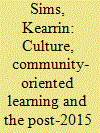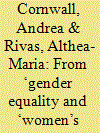| Srl | Item |
| 1 |
ID:
141898


|
|
|
|
|
| Summary/Abstract |
This article critically interrogates current policy-sector approaches to culturally sensitive development and the manner in which culture has been conceptualised within the post-2015 development agenda-setting process. By providing a brief interpretive summary of academic debates surrounding culture and development, an analysis of how ‘culturally sensitive’ practices have been pursued within the policy sector, and an examination of the insufficient consideration given to culturally sensitive development within post-2015 agenda setting, I argue that much uncertainty remains around how to translate complex academic understandings of culture and development into policy responses. Following this, I provide one case study drawn from the small, low-income country of Laos to suggest possibilities as to how culturally sensitive development may be better conceptualised and implemented within a post-2015 global development era.
|
|
|
|
|
|
|
|
|
|
|
|
|
|
|
|
| 2 |
ID:
137743


|
|
|
|
|
| Summary/Abstract |
The language of ‘gender equality’ and ‘women’s empowerment’ was mobilised by feminists in the 1980s and 1990s as a way of getting women’s rights onto the international development agenda. Their efforts can be declared a resounding success. The international development industry has fully embraced these terms. From international NGOs to donor governments to multilateral agencies the language of gender equality and women’s empowerment is a pervasive presence and takes pride of place among their major development priorities. And yet, this article argues, the fact that these terms have been eviscerated of conceptual and political bite compromises their use as the primary frame through which to demand rights and justice. Critically examining the trajectories of these terms in development, the article suggests that if the promise of the post-2015 agenda is to deliver on gender justice, new frames are needed, which can connect with and contribute to a broader movement for global justice.
|
|
|
|
|
|
|
|
|
|
|
|
|
|
|
|